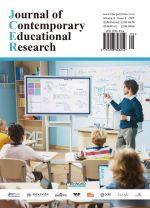Exploration of the Contradictions and Countermeasures in Medical Students' Internships, Postgraduate Entrance Examinations, and Employment from the Perspective of Work-Study Conflict
Abstract
Objective: The objective of this research is to thoroughly investigate the extent of mutual interference among clinical internships, postgraduate entrance examinations, and employment by examining engineering contradictions, thus offering theoretical insights and guidance for medical students to attain high-quality outcomes in clinical internships. Methods: A combination of literature reviews, questionnaires, interviews, and observations of internships was utilized, followed by a statistical analysis to assess the levels of interference among the three factors. Results: The senior participants achieved significantly higher scores than their junior counterparts in evaluations of comprehensive humanistic quality, understanding professional values, communication abilities, clinical skills, and attitudes towards learning, with differences that were statistically significant (p < 0.05). After applying an interactive training approach that merges early clinical practice with foundational medical education, both groups displayed notable enhancements in activity content, formats, instructor attitudes, clinical performance, and the blending of theory with practice (p < 0.05). Conclusion: By emphasizing ‘early clinical’ education, students are effectively engaged in clinical practice through active involvement, leading to feedback-oriented training. This strategy not only improves the overall quality of internships but also reduces the risk of scheduling conflicts with postgraduate entrance examinations and employment opportunities.
References
Wang H, Guangyong. L, zhao. G. Innovative Training Models to Resolve Work-Study Conflicts. Petroleum Human Resources. 2018: 79-82.
Peng Y, Park Y, Su S, Ma J. Developing and Testing a Model of Dynamic Changes in Work-School Conflict and Workplace Deviance Over Time. J Bus Psychol. 2023; 38: 589-605.
Li S, Jiang J. Construction of College Students' Employment Quality Evaluation Model System under the Background of Digitalization. J Environ Public Health. 2022; 2022: 4368369.
Chen H, Li T. Exploration and Practice of Improving Clinical Skills of Clinical Medicine Interns under the Background of "Emphasizing Postgraduate Entrance Examination over Internship". Journal of Xiangnan University (Medical Science). 2023; 25: 67-70.
Tie H, Luo Y, Chen D. Thinkings on the reform of medical education system in China. Med Educ Online. 2024; 29: 2302677.
Xu R, Wu J, Jin X, Tang M, Pang C, Yang Z, et al. A survey of attitudes towards the curriculum for clinical medicine postgraduates pursuing professional master's degrees: perspectives of supervisors and students. Front Med (Lausanne). 2024; 11: 1488139.
Xia. J, Li. R, Sun. W, Du. T, Niu. Z, Li. X, et al. Analysis of the Current Situation and Influencing Factors of Local Medical College Students' Plans for Postgraduate Entrance Examination. Chinese Health Service Management. 2022; 39: 636-40.
LI. D, Hu. Z. Exploration of the PI System in Cultivating Innovation Ability of Clinical Medicine Postgraduates under the "Four Certificates in One" Model. China Continuing Medical Education. 2024; 16: 173-8.
Isaac M. Role of humanities in modern medical education. Curr Opin Psychiatry. 2023; 36: 347-51.
Prince G, Osipov R, Mazzella AJ, Chelminski PR. Linking the Humanities With Clinical Reasoning: Proposaing an Integrative Conceptual Model for a Graduate Medical Education Humanities Curriculum. Acad Med. 2022; 97: 1151-7.
Tan. D, Xu. Y. Optimization of the Practice Path of Medical Students' Humanities Education under the Background of the Healthy China Strategy. Chinese Medical Ethics. 2018; 31: 1217-20.
Wang. H, Wang. Y. Reflections on the Systematic Cultivation of Humanities Literacy in Long-Term Clinical Medical Students. Chinese Medical Ethics. 2017; 30: 1164-6.
Liu. J, Gao. L, Chen. W. Analysis of the Current Status and Influencing Factors of Humanistic Competence among Clinical Medical Students in Medical Institutions Chinese Hospital Management. 2021; 41: 80-3.
Byram JN, Van Nuland SE, Harrell KM, Mussell JC, Cornwall J. Educator perspectives on non-technical, discipline-independent skill acquisition: An international, qualitative study. Anat Sci Educ. 2023; 16: 1102-17.
Guo H, Li H, Yao Y, Li Y, Huang Y. The application of integrating medical humanities education into emergency skill-training scenario simulation teaching. Front Med (Lausanne). 2025; 12: 1561504.
Zheng. Y, Gong. Q. Investigation into Empathy and Its Influencing Factors among Non-Intern Medical Students Modern Preventive Medicine. 2018; 45: 679-82.
Yang. W, Wu. C, Shi. L, Jiang. Y. Research on the Clinical Medical Interns overemphasizing Postgraduate Entrance Exams and neglecting Internship: Analysis and Counter Measure. Journal of Military Surgeon in Southwest China. 2019; 21: 590-2.
Zhang X, Pang HF, Duan Z. Educational efficacy of medical humanities in empathy of medical students and healthcare professionals: a systematic review and meta-analysis. BMC Med Educ. 2023; 23: 925.
Yu. L. Analysis of Challenges in Clinical Internship Teaching within the Department of Neurology and Exploration of Improvement Strategies China Health Industry. 2018; 15: 142-3.
Wu T. The Application of Mind Mapping Combined with PBL Teaching Model in the Clinical Training of Respiratory Medicine Interns. Journal of Jilin Medical Univeristy. 2025; 46: 154-7.

